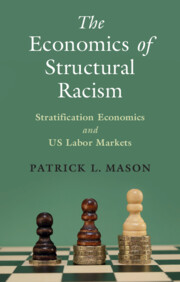Book contents
- The Economics of Structural Racism
- Cambridge Studies in Stratification Economics: Economics and Social Identity
- The Economics of Structural Racism
- Copyright page
- Dedication
- Contents
- Figures
- Tables
- Part I Foundations
- Part II African American Educational Progress and Transformations in Family Structure, 1965–Present
- 5 African American Educational Progress
- 6 Transformations in Family Structure
- Part III African American Income and Wealth, 1965–Present
- Part IV Structural Racism, 1965–Present
- Part V Restatement and Discussion
- References
- Index
6 - Transformations in Family Structure
from Part II - African American Educational Progress and Transformations in Family Structure, 1965–Present
Published online by Cambridge University Press: 06 April 2023
- The Economics of Structural Racism
- Cambridge Studies in Stratification Economics: Economics and Social Identity
- The Economics of Structural Racism
- Copyright page
- Dedication
- Contents
- Figures
- Tables
- Part I Foundations
- Part II African American Educational Progress and Transformations in Family Structure, 1965–Present
- 5 African American Educational Progress
- 6 Transformations in Family Structure
- Part III African American Income and Wealth, 1965–Present
- Part IV Structural Racism, 1965–Present
- Part V Restatement and Discussion
- References
- Index
Summary
An important change occurred in African American family structure during the era of racialized managerial capitalism: a major increase in the fraction of men and women in the 20s and 30s who were never-married. A fall in marriage-eligible men is a major factor responsible for this change. As per the Darity-Myers index of African American male marginalization, there will be an increase in the fraction of marriage-eligible men (and, therefore, increased marriage) with an increase in their earnings and employment, reducing premature deaths and disability, increasing college enrollment, reducing contact with the criminal legal system and reducing incentives for criminal behavior, and reducing premarital births and dissolution of unions when children are present. This perspective suggests that it is changes in economic well-being that cause changes in family structure, not the reverse. Family functioning is different from family structure. The empirical data suggests that, on average, African American families have strong family functioning.
Keywords
- Type
- Chapter
- Information
- The Economics of Structural RacismStratification Economics and US Labor Markets, pp. 140 - 166Publisher: Cambridge University PressPrint publication year: 2023

